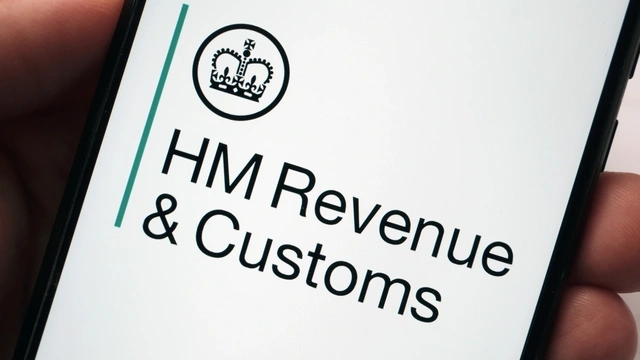HMRC scams are more common than you might think. Over 130,000 reports of tax scams were received by HMRC in 2023 alone. And while they are common in January and April, when taxes are due, they happen all year round.
We’re exploring what different HMRC scams could look like and the warning signs to look out for. Plus, tips from our in-house fraud expert on how to protect yourself.
Scammers will impersonate HMRC in different ways
In HMRC scams, the fraudster’s aim is to trick you into giving personal or financial details to steal your money or commit identity theft.
There are lots of ways that scammers will try to get their hands on your personal information and money.
Phishing emails and texts
Scammers send emails or texts pretending to be from HMRC. Usually, the message will say you’re due a tax rebate and provide a link to click and claim. They use a range of techniques to appear genuine, including logos, colours and familiar reference numbers.
One common technique is known as ‘number spoofing.’ This makes texts look authentic, as they will flag up as from HMRC. Often, they’re asking for personal or financial information or direct you to fake HMRC websites to steal your data or your money.
Phone scams
In some HMRC scams, the fraudster calls you and asks you to make an urgent payment for taxes owed. They may threaten you with legal action if you don't comply or tell you that there’s a warrant out for your arrest. They could also offer fake rewards to create a sense of urgency.
Fake letters
Letters using forged HMRC logos and official-looking documents are surprisingly common. They’re usually used to demand payment for taxes owed or provide false information about refunds due. With these types of letters, the payment information and contact details will usually be fake.
Refund companies
You may receive texts or emails from supposed tax rebate companies. They will usually ask for a fee in exchange for them claiming tax refunds or rebates on your behalf.
It’s important that you check the small print and disclaimers before using their services. You can also check to see how legitimate a company is by looking for their Company Registration Number (CRN). This confirms that they are registered with Companies House. Registered companies have their CRN displayed clearly on their website.
Identity theft
Personal information can be stolen through various means. Phishing emails, texts, and phone calls are used to commit identity theft and financial fraud in the victim's name.
How to spot HMRC scams
There are certain red flags to look out for that can make avoiding HMRC scams a little easier.
- Being contacted out of the blue. If you receive an unexpected email, text, or phone call from HMRC, be cautious.
- The message or call seems urgent or threatening. If you feel pressured into providing information or making payments quickly, then it’s likely to be a scam. They may threaten legal action, fines, or arrest if you don't comply immediately.
- Requests for personal information. This could include your bank account details, National Insurance number, or passwords. HMRC will never ask for this information via email, text, or phone.
- Suggesting the use of unusual payment methods such as gift cards or cryptocurrency.
- Poor grammar and spelling are clear warning signs that an email, text message, or letter may not be legit.
- Emails or texts with attachments or links may contain malware designed to steal your information.
- Claims of unexpected rebates or penalty fines are common. HMRC won’t notify you of these via text or email.
- Notifications of underpaid taxes if you usually pay by PAYE. If you’ve underpaid on your taxes but usually make payments by PAYE, you’re unlikely to be asked to pay additional tax via letter, email, or text. That’s because in cases like these, your tax code will automatically be adjusted if you’ve underpaid, and you won’t have to pay anything yourself.
Protecting yourself against HMRC scams
Even the savviest person can be fooled by an authentic looking HMRC scam. To help, we spoke to our in-house fraud expert, Ben Fleming, about what you can do to avoid falling victim to these scams. Here are his tips:
- If it looks too good to be true, then it probably is. If you pay your taxes by PAYE, then it’s very unlikely that your taxes have been worked out wrong.
- Contact HMRC directly by using search engines to find their website if you're unsure about how genuine something is. Don’t use the contact details on any letters, emails or texts you have received.
- Never share personal or financial information. HMRC will never ask for these details over the phone, in a text, or in an email.
- Be careful how you make payments. There are lots of ways to make a payment to HMRC, including Direct Debit, bank transfer, and card payments which means lots of ways for scammers to target you. You should always get legitimate payment details directly from HMRC online.
- Ask for your unique taxpayer reference number if you’re unsure about how genuine a call from HMRC is. A legitimate HMRC employee would know this. It will be on all official letters from HMRC as well.
- Don’t click on links in unexpected texts or emails. Sometimes HMRC will provide a link to their official website or their web chat. If you’re provided with a link to claim your tax rebate or pay money, it’s likely to be malicious.
What to do if you suspect a scam
Here’s our step-by-step checklist on what to do if you think you’ve spotted an HMRC scam:
- Do not respond to texts, letters, or emails.
- Report the scam to HMRC.
- Keep records of any correspondence or attempts at scamming.
- Notify your bank if you've provided any sensitive information or money.
- Report the scam to Action Fraud.
- Call your local police department on 101 if you’ve sent money to a scammer in the last 24 hours, and if you or anyone near you are in immediate danger, call 999.
Fiona is a personal finance writer with over 7 years’ experience writing for a broad range of industries before joining Ocean in 2021. She uses her wealth of experience to turn the overwhelming aspects of finance into articles that are easy to understand.
![Email icon]()
Become a money maestro!
Sign up for tips on how to improve your credit score, offers and deals to help you save money, exclusive competitions and exciting products!
Find this useful? Share it with others!









